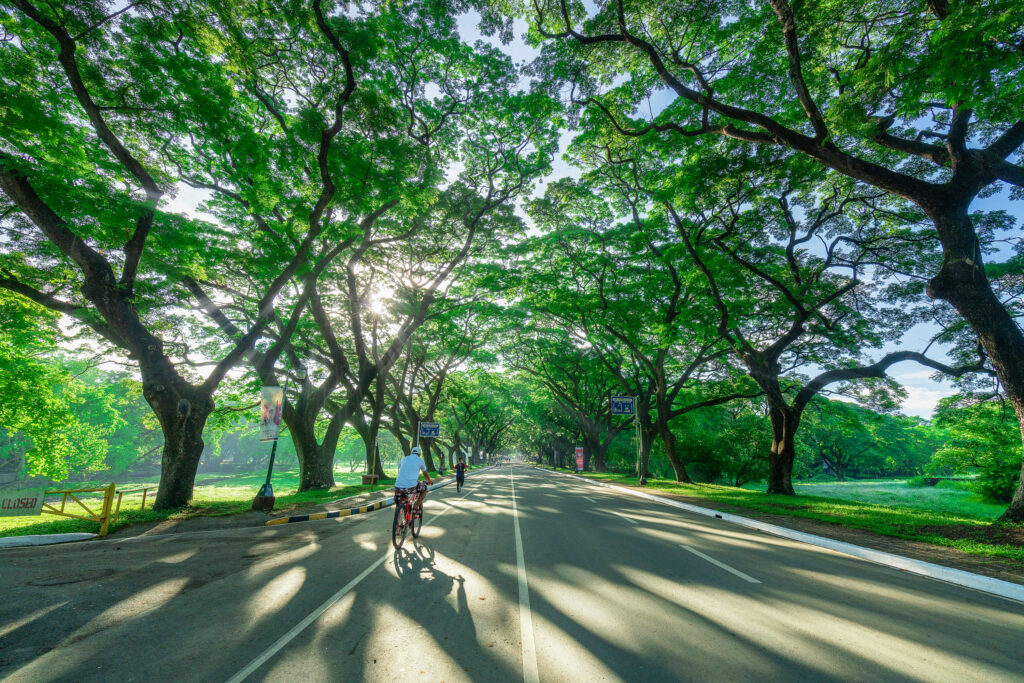5–16 August 2024
University of the Philippines Diliman, Quezon City
Tense and Tender Tropics: Ecologies of Vulnerability and Care
“… we seem to be waiting for the tsunami, or comet, or volcano eruption, or nuclear disaster to trigger the end of the world. What none of us appear to be reckoning with is the idea that the apocalypse, having begun long since, might last for the entirety of our lifetimes; that we could live through this slow worsening, the poisoning of sky, water, land, and mind as the world heats up, resources become more scarce, and violent conflict spreads. Ask yourself: what will you do if things don’t get better, and also the world doesn’t end? Who will you show up for, and how?”
– Omar Sakr, “Head in the Sand” (2019)
Crises mark the points of irresolvable tension and shattering, where the breakdowns of identities, infrastructures, and systems expose untenable conditions, force a reckoning with breached thresholds, and signal the urgency of recomposition, reorientation, or building anew. If crises call forth criticism – as well as new ways of understanding, conducting, representing, and transmitting forms and practices of feeling, knowing, and relating – then contemporary Philippines may well serve as a generative focal point. Under the duress of a confluence of forces – the climatological, the geopolitical, and the biopolitical and necropolitical – Philippine society exemplifies intersecting problems and contradictions that characterize life in many a postcolony: inequality, poverty, and generalized precarity, imperial and neocolonial economies of extraction and underdevelopment, urban sprawl, social segregation, and fragmented publics, political polarization and state repression, disputes over borders and sovereignty, dependency on imperial military, and anthropogenic activity exacerbating natural calamity. In a time when states of “emergency” saturate the experience of the “everyday,” and the very apprehension of historic and historical problems feels complex and confusing, can we, as scholars, researchers, teachers, activists, artists, and cultural workers, render, in Fredric Jameson’s term, a “cognitive map” of the present, without being caught in a blockage of endless description and critique?
For crises and attendant vulnerabilities impel not only criticism but also care. From a shared capacity that springs from the entanglement of our intimate and collective lives and social realities, care has been turned into a material and affective resource to be coaxed and extracted from particular bodies, or outsourced across geopolitical boundaries. The unequal and objectified deployment of and access to care in societies, exacerbated by and extending beyond the pandemic, is a crisis in itself. Amidst an ecology of vulnerability, where oppressive systems and individualized risk are accepted as part of the normal functioning of societies, how may we intervene in and resist apocalyptic narratives of helplessness and inevitability to carve out spaces for the imagination, articulation, and exercise of alternative modes of being and relating that place communal care and collective resilience and responsibility at the center of our desired futures?
“Tense and Tender Tropics: Ecologies of Vulnerability and Care” is a ten-day summer school that engages interdisciplinary perspectives on the manifold crises and attendant creative, resistive, and caring practices that shape the experiences of peoples in Asia today, giving emphasis to and drawing connections from their particular manifestations in the Philippines. Aside from lectures, seminars, creative workshops, and film screenings, participants will visit sites of cultural contention in or around Metro Manila, and converse with artists and activists involved in grassroots organization, mobilization, memorialization, education, mutual aid, and solidarity-building across classes, communities, and localities.
The full programme, including information about lectures, workshops, speakers, etc. can be downloaded here. The website of our host institution, the Department of English and Comparative Literature, University of the Philippines Diliman can be accessed here.
Confirmed speakers and workshop facilitators
Christian BENITEZ, Ateneo de Manila University and Chulalongkorn University
Oscar V. CAMPOMANES, Ateneo de Manila University
Beng Huat CHUA, National University of Singapore
Conchitina CRUZ, University of the Philippines Diliman
Faye CURA, Gantala Press
Adam DAVID, Paper Trail Projects and BLTX
Mabi DAVID, Good Food Community
Anjeline DE DIOS, Independent artist and researcher
Irish DEOCAMPO, University of the Philippines Diliman
Glenn DIAZ, Ateneo de Manila University
Maria Carmen (Ica) FERNANDEZ, University of Cambridge
Elmo GONZAGA, The Chinese University of Hong Kong
Tessa Maria GUAZON, University of the Philippines Diliman
Judy Celine ICK, University of the Philippines Diliman
Lisa ITO-TAPANG, University of the Philippines Diliman
Thiti JAMKAJORNKEIAT, University of Victoria
Julie JOLO, University of the Philippines Diliman
Rimi Parvin KHAN, National University of Singapore
Augusto LEDESMA, University of the Philippines Diliman
Fran MARTIN, The University of Melbourne
Madhuja MUKHERJEE, Jadavpur University
Tejaswini NIRANJANA, Ahmedabad University
Timothy ONG, University of the Philippines Diliman and University of Massachusetts
Anna Felicia SANCHEZ, University of the Philippines Diliman
Nishant SHAH, The Chinese University of Hong Kong
Chih-Ming WANG, Academia Sinica
Yukari YOSHIHARA, University of Tsukuba
Host
Department of English and Comparative Literature, University of the Philippines Diliman, Quezon City
Coordinator
Kristine Marie REYNALDO, Department of English and Comparative Literature, University of the Philippines Diliman (ktreynaldo@up.edu.ph)
Course Fees
225 USD for international participants
This includes on-campus dormitory accommodations (August 4, 2024 check-in, August 17, 2024 check-out), welcome dinner, lunch (during class days), and local transportation for off-campus field trips
115 USD for local participants
Local participants will not be offered accommodation.
Fee Waiver
Very limited fee waivers are available for those in need.
Note
The IACS Society will not be able to support your travel to Quezon City, Philippines. Please seek travel funding from your home institutions.
Important Dates
Application Deadline: 15 March 2024 (23:59 PHT/GMT+8)
Acceptance Announcement: 2 April 2024 (8 April for applications submitted between 1 and 15 March)
Deadline of Offer Confirmation by Students: 3 May 2024
Application Procedure
The application period has now ended.
If you have any inquiries, please email iacssummerschool2024@gmail.com.
